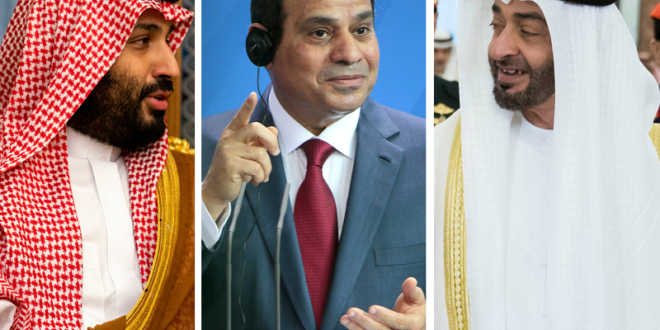The DOJ just charged a man in New York with spying on critics of Egyptian President al-Sisi. But what about the guys pulling the strings?
On Thursday the Department of Justice (DOJ) announced the arrest and indictment of a Manhattan man, Pierre Girgis, for allegedly spying on critics of Egyptian President Abdel Fattah Al-Sisi, at the behest of Egyptian officials. “This indictment begins the process of holding him accountable for his actions in contravention of our laws and values,” explained an Assistant Attorney General.
Noticeably absent from the announcement—or any public commentary from DOJ or the Biden administration writ large, for that matter—is how the unnamed “Egyptian officials,” who were the masterminds of this illicit influence operation, will be held accountable. Unfortunately, this omission is not an exception: Allowing foreign powers to meddle in America without serious consequences is the new, dangerous normal.
When the U.S. government discovers an illicit influence operation, the operatives in the U.S. are, appropriately, apprehended and held to account, but the architects of these illicit operations face little, if any, consequences for their actions. In short, we punish the pawns and leave the chess masters unchecked.
Egypt is just the latest authoritarian government to orchestrate an illicit campaign in America and go unpunished.
The United Arab Emirates (UAE), for example, has repeatedly been caught running illicit influence operations in the U.S. Last summer the FBI indicted Tom Barrack and his alleged co-conspirators for “unlawful efforts to advance the interests of the United Arab Emirates (UAE) in the United States at the direction of senior UAE officials.” In 2019 DOJ indicted Andy Khawaja and seven others for funneling a total of more than $5 million in illicit campaign contributions into U.S. elections at the behest of UAE officials, including UAE Crown Prince Mohammed bin Zayed (MBZ). The UAE was also behind a $2.5 million covert campaign in 2017 run by George Nader and Trump fundraiser Elliott Broidy to convince members of Congress to take a tough stance on Qatar.
In all these instances, the pawns—like Barrack, Khawaja, and Nader—were held accountable, but the high ranking UAE officials—like MBZ—were not punished for masterminding these attacks on American democracy.
The same has been true for Saudi Arabia’s meddling in America. In 2019, two former Twitter employees were charged with spying on Twitter users critical of the Kingdom. The Saudi Embassy has been accused of operating a ring of “fixers” that help Saudi citizens flee the U.S. when they’re accused of crimes, including rape, murder, and child pornography. Despite near universal outrage for the Saudi regimes heinous murder of U.S. resident and Saudi dissident Jamal Khashoggi, it took more than two years for the U.S. to to punish anyone involved. Even then, the so-called “Khashoggi ban” punishments doled out by the Biden administration in early 2021 stopped short of punishing Saudi Crown Prince Mohammed bin Salman, whom the intelligence community determined was ultimately responsible for authorizing the murder.
Just as with Egypt and the UAE, the pawns in Saudi Arabia’s misadventures were punished while the chess masters behind them faced no consequences, free to stay at the table and keep playing toward the same, dangerous endgame. This incomplete approach to punishing authoritarian misdeeds has created an environment where malign foreign actors are emboldened to meddle in America. The pawns in these illegal activities can be easily replaced. When a Pierre Girgis or George Nader is taken off the board, Egypt and the UAE can easily seek out the next opportunist willing to do their dirty work.
The Biden administration’s approach is a marked improvement from President Donald Trump, who publicly invited malign actors like China and Russia to meddle in American politics. However, President Biden’s failure to punish all of the “government officials” running these operations all but guarantees we will continue to see more of these attempts to covertly influence the U.S. political process.
It’s well past time that our government took these attacks on our democratic institutions seriously, and established real disincentives–including asset seizures and other punitive measures–to discourage malign foreign actors from ever beginning illicit influence operations in the U.S. Continuing to only punish the pawns, not the malign foreign actors directing them, will lead to continued attacks on democracy in America.
 Eurasia Press & News
Eurasia Press & News




